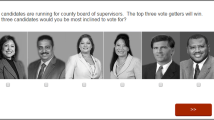Abstract
To investigate age-related differences in strategies used to evaluate political candidates, an experimental study employed protocol tracing techniques with a computerized information matrix. Forty younger and forty older adults gathered information about and evaluated candidates in national and local elections. Older adults accessed less information but took longer to examine information and make choices. Differences in strategic processing suggest that young adults were more likely to organize their information searches by issues and to eliminate candidates based on issue stances. In contrast, older adults were more likely to organize their information searches by candidates and to engage in satisficing.
Similar content being viewed by others
References
Abelson, Robert P., and Levi, Ariel (1985). Decision making and decision theory. InHandbook of Social Psychology, Gardner Lindzey, and Elliot Aronson (eds.). New York: Random House.
Baltes, Paul B., and Baltes, Margret M. (1992). Psychological perspectives on successful aging: The model of selective optimization with compensation. InSuccessful Aging: A Psychological Model, Paul Baltes, and Margaret Baltes (eds.). Cambridge: Cambridge University.
Berelson, Bernard R., Lazarsfield, Paul F., and McPhee, William N. (1954).Voting. Chicago: University of Chicago.
Campbell, John C., and Strate, John (1981). Are old people conservative?Gerontologist 21: 580–591.
Campbell, Angus, Converse, Philip E., Miller, Warren E., and Stokes, Donald E. (1960).The American Voter Chicago: University of Chicago.
Charness, Neil (1989). Age and expertise: Responding to Tolland's challenge. InEveryday Cognition in Adulthood and Late Life, Leonard Poon, David Rubin, and Barbara, Wilson (eds.). Cambridge: Cambridge University.
Cutler, Neal E. (1977). Demographic, social psychological, and political factors in the politics of aging: A foundation for research in “political gerontology”American Political Science Review 71: 1011–1025.
Day, Christine L. (1990).What Older Americans Think: Interest Groups and Aging Policy. Princeton, NJ: Princeton University.
Einhorn, H. J., and Hogarth, R. M. (1981). Behavioral decision theory: Process of judgment and choice.Annual Review of Psychology 32: 53–88.
Enelow, James M., and Hinich, Melvin J. (1984).The Spatial Theory of Voting: An Introduction. Cambridge: Cambridge University.
Ferejohn, John A., and Kuklinski, James H. (eds.) 1990.Information and Democratic Processes. Urbana, IL: University of Illinois.
Fiorina, Morris P. (1981).Retrospective Voting in American National Elections. New Haven, CT: Yale University.
Fiske, Susan T., Kinder, Donald R., and Larter, W. Michael (1983). The novice and the expert: Knowledge-based strategies in political cognition.Journal of Experimental Social Psychology 19: 381–400.
Hershey, Douglas A., Walsh, David A., Read, Stephen J., and Chulef, Ada S. (1990). The effects of expertise on financial problem solving: Evidence for goal directed problem solving scripts.Organizational Behavior and Human Decision Processes 46: 77–101.
Herstein, John A. (1981). Keeping the voter's limits in mind: A cognitive process analysis of decision making in voting.Journal of Personality and Social Psychology 40: 843–861.
Jacobs, Bruce (1990). Aging and politics. InHandbook of Aging and the Social Sciences, 3rd ed.
Jennings, M. Kent, and Markus, Gregory B. (1988). Political involvement in the later years: A longitudinal study.American Journal of Political Science 32: 302–316.
Johnson, Mitzi M. S. (1990). Age differences in decision making: A process methodology for examining strategic information processing.Journals of Gerontology: Psychological Sciences 45: 75–78.
Johnson, Mitzi M. S. (1993). Thinking about strategies during, before, and after making a decision.Psychology and Aging 8: 231–241.
Johnson, Mitzi M. S., and Riggle, Ellen D. B. (1994). Age-Related Differences in Processing Information for Attitude-Laden Decisions. Paper presented at the Cognitive Aging Conference, Atlanta, Georgia.
Lau, Richard R., and Redlawsk, David P. (1992). How Voters Decide: A Process Tracing Study of Decision Making During Political Campaigns. Paper presented at the annual meeting of the American Political Science Association. Chicago.
Lau, Richard R., and Sears, David O. (eds.) 1986.Political Cognition. Hillsdale, NJ: Lawrence Erlbaum.
Lodge, Milton, McGraw, Kathlee M., and Stroh, Patrick (1989). An impressiondriven model of candidate evaluation.American Political Science Review 83: 399–419.
Murphy, M. D., and Puff, C. Richard (1982). Free recall: Basic methodology and analysis. InHandbook of the Psychology of Aging, C. Richard Puff (ed.). San Diego, CA: Academic Press.
Nie, Norman H., Verba, Sidney, and Petrocik, John R. (1976).The Changing American Voter. Cambridge, MA: Harvard University.
Payne, John W., Bettman, James R., and Johnson, Eric J. (1993).The Adaptive Decision Maker. Cambridge, MA: Cambridge University.
Rhodebeck, Laurie A. (1993). The politics of greed? Political preferences among the elderly.Journal of Politics 55: 342–364.
Sinnot, Jan D. (1984). A Model for Solution of Ill-structured Problems: Implications for Everyday and Abstract Problem Solving. Paper presented at the annual meeting of the Gerontological Society of America, San Francisco, CA.
Streufert, Siegfried, Pogash, Rosanne, Piasecki, Mary, and Post, Gerald M. (1990). Age and management team performance.Psychology and Aging 5: 551–559.
Svenson, Olga (1979). Process descriptions of decision making.Organizational Behavior and Human Performance 23: 86–112.
Zellman, Gail L. (1975). Antidemocratic beliefs: A survey and some explanations.Journal of Social Issues 31: 31–53.
Author information
Authors and Affiliations
Rights and permissions
About this article
Cite this article
Riggle, E.D.B., Johnson, M.M.S. Age difference in political decision making: Strategies for evaluating political candidates. Polit Behav 18, 99–118 (1996). https://doi.org/10.1007/BF01498661
Issue Date:
DOI: https://doi.org/10.1007/BF01498661




